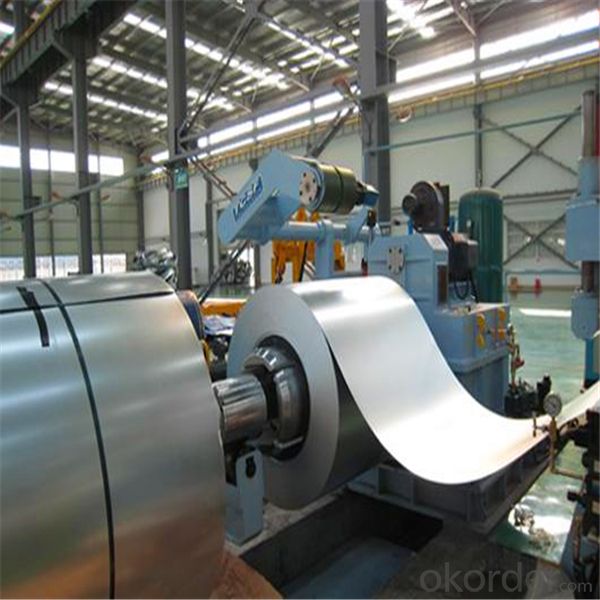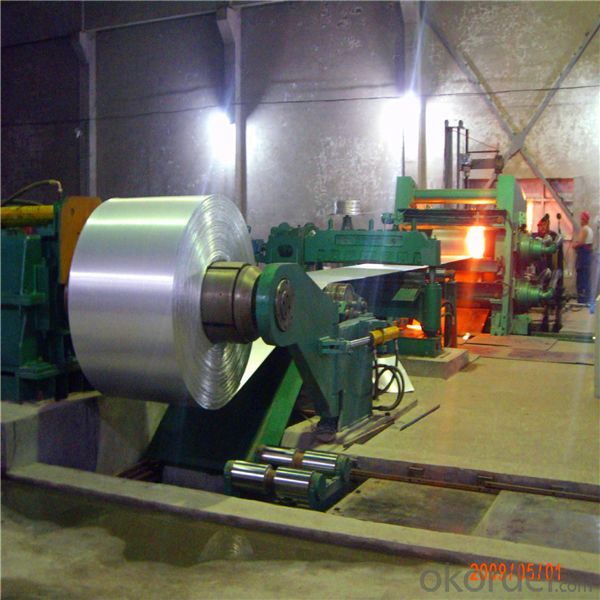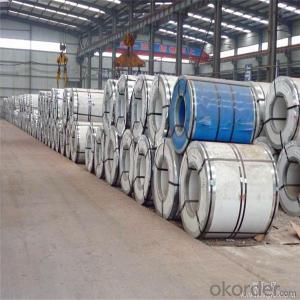Prime Cold Rolled Steel Coils with Low Price China Suppiler
- Loading Port:
- China main port
- Payment Terms:
- TT OR LC
- Min Order Qty:
- 12 m.t.
- Supply Capability:
- 50000 m.t./month
OKorder Service Pledge
Quality Product, Order Online Tracking, Timely Delivery
OKorder Financial Service
Credit Rating, Credit Services, Credit Purchasing
You Might Also Like
Item specifice
Standard:
ASTM,GB,DIN,JIS
Technique:
Cold Rolled
Shape:
Round
Surface Treatment:
Oiled,Bright
Steel Grade:
Q195,Q215,Q235,Q215B,Q235B
Certification:
ISO,SGS,BV,CE
Thickness:
0.18mm-1.8mm
Width:
1000mm-1600mm
Length:
requirement
Outer Diameter:
according to weight
Net Weight:
12mt
Packaging:
Standard Export Packing
Product Description
201 2B, BA Stainless Steel Strips/CoilsCold Rolled Stainless Steel Coil (POLISHING)
Thickness: 0.15mm to 1.80 mm
Width: 20mm - 690mm
Finish: 2B BA (two side polishing)
201 2B, BA Stainless Steel Coil
Hot rolled stainless steel coil:
Thickness: 2.0mm up
Width: 20-1500mm
Finish: No. 1
| Thickness | cold rolled,0.15-1.8mm, hot rolled, 2.0mm up |
| Width | cold rolled,20-690mm, hot rolled, 20-1500mm |
| Finish | cold rolled, 2B BA (two side polishing)201 2B,BA hot rolled,No.1 |
Chemical composition:
1) AOD (Low carbon, high nickel) J1 material:
Ni: 1.0-1.5%, Cu:0.8-1.0%, Cr:>13.5%, Mn:9-11%, C:<0.1%
2) AOD (Low carbon, high nickel) J3 material:
Ni: 1.0-1.5%, Cu:0.5-0.8%, Cr:>12%, Mn:9-11%, C:<0.1%
3) Induction (High carbon, low nickel) material:
Ni: 0.6-0.9%, Cu:0.6-0.8%, Cr:>13.0%, Mn:9-11%, C:>0.12%201 2B, BA Stainless Steel Strips/Coils
Cold Rolled Stainless Steel Coil (POLISHING)
Thickness: 0.15mm to 1.80 mm
Width: 20mm - 690mm
Finish: 2B BA (two side polishing)
201 2B, BA Stainless Steel Coil
Hot rolled stainless steel coil:
Thickness: 2.0mm up
Width: 20-1500mm
Finish: No. 1
Application: Stamping, Utensils, Kitchenware, Cookware, Decorate, Making pipe and so on


- Q:What are the common coil handling challenges?
- Common coil handling challenges include the risk of coil damage during handling and transportation, difficulties in aligning and positioning coils accurately, issues with coil slippage and instability, as well as the need for specialized equipment to safely and efficiently handle large and heavy coils. Additionally, managing coil edges and preventing injuries to workers are also common challenges faced in coil handling processes.
- Q:How are steel coils protected from humidity?
- Steel coils are typically protected from humidity through a process called galvanization, where a layer of zinc or another protective coating is applied to the surface of the steel. This coating acts as a barrier, preventing moisture from coming into direct contact with the steel and minimizing the risk of corrosion. Additionally, steel coils are often stored in dry, enclosed spaces or wrapped with moisture-resistant materials such as plastic or wax paper to further protect them from humidity.
- Q:What are the common applications of steel coils?
- Steel coils have a wide range of applications across various industries, including automotive, construction, manufacturing, and appliance sectors. They are commonly used in the production of automobiles, machinery, and infrastructure components like bridges and buildings. Additionally, steel coils are utilized in the manufacturing of household appliances, such as refrigerators and washing machines. Their versatility, strength, and durability make steel coils a crucial material for many industrial applications.
- Q:Can steel coils be recoiled?
- Yes, steel coils can be recoiled. Recoiling involves rewinding a steel coil into a more compact shape, typically to improve storage or transportation efficiency. This process is commonly used in industries such as manufacturing, construction, and transportation.
- Q:How are steel coils used in the production of transportation equipment?
- Steel coils are used in the production of transportation equipment as they are formed and shaped into various components such as vehicle frames, bodies, and structural parts. These coils provide the necessary strength and durability required for manufacturing automobiles, trains, ships, and airplanes.
- Q:What are the limitations of using steel coils in certain applications?
- One limitation of using steel coils in certain applications is their susceptibility to corrosion. Steel coils can rust when exposed to moisture or harsh environments, which can affect their structural integrity and performance. Additionally, steel coils can be heavy and bulky, making them less suitable for applications that require lightweight materials or intricate designs. Finally, steel coils may not be suitable for applications that require specific electrical or thermal conductivity properties, as steel is not the most conductive material in these aspects.
- Q:I have a mountain bike w/ 26 wheels. My question is what's the biggest difference between aluminum vs. steel? If most of my riding is off-road, wouldn't the steel wheels be stronger/more durable?
- You would think that is the case, right? Well, it isn't. Steel rims are necessarily made of very thin sheet. This sheet, when formed into a rim tends to dent very easily. On top of that, because the material is so thin it can and does flex- a lot. Aluminum rims on the other hand are formed by a process called extrusion... basically, a big block of material is shoved through a die (think PlayDoh shape maker) and then formed into rims. This forming process along with the stiffer nature of aluminum (in this instance) makes an aluminum rim far stronger and far lighter than a steel counterpart.
- Q:How are steel coils inspected for surface finish using profilometry?
- Steel coils are inspected for surface finish using profilometry by measuring the surface topography using a profilometer. The profilometer scans the surface of the steel coil and records the deviations from the ideal surface. This data is then used to determine the roughness, waviness, and other surface parameters of the steel coil, providing a quantitative assessment of its surface finish quality.
- Q:Can steel coils be used in outdoor applications?
- Yes, steel coils can be used in outdoor applications. Steel is known for its durability and strength, making it suitable for a wide range of outdoor uses. Steel coils are often used in applications such as construction, automotive manufacturing, and transportation industries. They are resistant to harsh weather conditions, including rain, snow, and UV exposure. Additionally, steel coils are often coated with protective finishes, such as galvanized or painted coatings, to further enhance their resistance to corrosion and extend their lifespan. Overall, steel coils are a reliable and versatile option for outdoor applications due to their strength, durability, and resistance to environmental factors.
- Q:What are the different methods of coil rewinding for steel coils?
- There are several different methods of coil rewinding for steel coils, each with its own advantages and considerations. One common method is the slitting and rewinding process. This involves cutting the original steel coil into narrower strips, often referred to as "slits," and then rewinding these slits onto separate reels. Slitting and rewinding allows for customization of the coil width and is commonly used in industries such as automotive, construction, and packaging. Another method is the oscillate winding technique. This method involves rewinding the steel coil in a back-and-forth manner, creating a tighter and more compact coil. Oscillate winding is particularly beneficial for reducing coil deformation during transportation and storage, as well as optimizing material usage. Additionally, the pancake coil winding method is often employed for steel coils. With this technique, the steel coil is rewound in a flat, pancake-like shape, allowing for easier processing and handling. Pancake coils are often used in applications where space is limited, such as in electrical transformers. Furthermore, some advanced coil rewinding methods utilize automated equipment, such as robotic systems or computer-controlled winding machines. These technologies ensure precise and consistent rewinding, reducing human error and improving overall efficiency. Ultimately, the choice of coil rewinding method depends on the specific requirements of the application, including coil dimensions, material properties, and desired production output. Manufacturers must carefully consider factors such as coil quality, cost-effectiveness, and equipment capabilities when selecting the most suitable method for their steel coil rewinding process.
1. Manufacturer Overview |
|
|---|---|
| Location | |
| Year Established | |
| Annual Output Value | |
| Main Markets | |
| Company Certifications | |
2. Manufacturer Certificates |
|
|---|---|
| a) Certification Name | |
| Range | |
| Reference | |
| Validity Period | |
3. Manufacturer Capability |
|
|---|---|
| a)Trade Capacity | |
| Nearest Port | |
| Export Percentage | |
| No.of Employees in Trade Department | |
| Language Spoken: | |
| b)Factory Information | |
| Factory Size: | |
| No. of Production Lines | |
| Contract Manufacturing | |
| Product Price Range | |
Send your message to us
Prime Cold Rolled Steel Coils with Low Price China Suppiler
- Loading Port:
- China main port
- Payment Terms:
- TT OR LC
- Min Order Qty:
- 12 m.t.
- Supply Capability:
- 50000 m.t./month
OKorder Service Pledge
Quality Product, Order Online Tracking, Timely Delivery
OKorder Financial Service
Credit Rating, Credit Services, Credit Purchasing
Similar products
New products
Hot products
Hot Searches
Related keywords




























